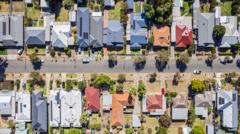With just weeks to go before the federal election, the housing crisis in Australia has emerged as a significant concern for voters. Rising property prices and soaring rental costs have made homeownership a distant dream for many, forcing the two leading political parties to propose varying solutions to tackle this pressing issue. The Labor Party and the Liberal-National Coalition outline their strategies, but experts warn that current proposals may fall short of effectively addressing the crisis.
Australia's Housing Crisis Takes Centerstage Amid Election Countdown

Australia's Housing Crisis Takes Centerstage Amid Election Countdown
As the federal election approaches, housing affordability challenges stand at the forefront of debate in Australia.
The Australian housing market is witnessing an unprecedented surge in prices, driven by a combination of burgeoning demand and insufficient housing supply. Since 2018, house prices across the nation have soared by over 39%, leaving many prospective buyers locked out of the market. High demand and restrictive zoning laws are exacerbating the shortage of affordable housing in major cities like Sydney, where average home prices are nearing A$1.2 million - making it one of the least affordable cities globally.
Rents have similarly skyrocketed, increasing by approximately 36.1% during the pandemic, with Sydney's median weekly rent reaching A$773. Many Australians now face significant cost-of-living pressures, and the ongoing housing crisis is intensifying calls for systemic changes to housing policy.
While the ascent of housing prices has been a topic of heated discussion, immigration and foreign investment are often raised as contributing factors. However, experts assert that these do not significantly impact the current housing shortage. Although local government initiatives aim to increase housing stock, satisfying the demand remains a colossal challenge.
In their campaign pledges, both major parties have promised to ramp up housing construction, with Labor aiming to build 1.2 million new homes and the Coalition planning for 500,000. Additional strategies include shared-equity loans to assist first-time homebuyers and investment in infrastructure to support local councils. Nevertheless, experts caution that these measures alone will not resolve the systemic issues plaguing the Australian housing market.
As the election draws closer, the fate of affordable housing in Australia rests upon the electorate's decisions. Voters are keenly aware that any recovery from this crisis will be a long and arduous journey requiring more than promises on paper.
In summary, Australia's housing crisis looms large over the upcoming federal election, with rising costs highlighting the urgent need for meaningful solutions from political leaders. The promise of housing affordability is a key topic shaping voter sentiment as Australia grapples with one of its most pressing social issues.
Rents have similarly skyrocketed, increasing by approximately 36.1% during the pandemic, with Sydney's median weekly rent reaching A$773. Many Australians now face significant cost-of-living pressures, and the ongoing housing crisis is intensifying calls for systemic changes to housing policy.
While the ascent of housing prices has been a topic of heated discussion, immigration and foreign investment are often raised as contributing factors. However, experts assert that these do not significantly impact the current housing shortage. Although local government initiatives aim to increase housing stock, satisfying the demand remains a colossal challenge.
In their campaign pledges, both major parties have promised to ramp up housing construction, with Labor aiming to build 1.2 million new homes and the Coalition planning for 500,000. Additional strategies include shared-equity loans to assist first-time homebuyers and investment in infrastructure to support local councils. Nevertheless, experts caution that these measures alone will not resolve the systemic issues plaguing the Australian housing market.
As the election draws closer, the fate of affordable housing in Australia rests upon the electorate's decisions. Voters are keenly aware that any recovery from this crisis will be a long and arduous journey requiring more than promises on paper.
In summary, Australia's housing crisis looms large over the upcoming federal election, with rising costs highlighting the urgent need for meaningful solutions from political leaders. The promise of housing affordability is a key topic shaping voter sentiment as Australia grapples with one of its most pressing social issues.




















